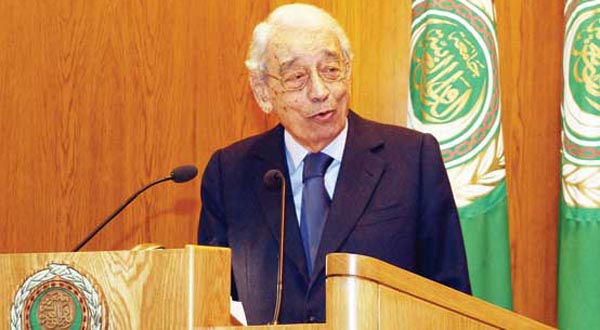 CAIRO: Simmering tensions between Egypt’s Muslims and Christians threaten to permanently erode our historic culture of tolerance, Boutros Boutros-Ghali wrote in an opinion article published in The Wall Street Journal on Friday.
CAIRO: Simmering tensions between Egypt’s Muslims and Christians threaten to permanently erode our historic culture of tolerance, Boutros Boutros-Ghali wrote in an opinion article published in The Wall Street Journal on Friday.
Muslim-Christian tension threatens to erode culture of tolerance, says Boutros-Ghali
By-Marwa Al-A’sar-Daily News Egypt
Top Stories
00:01
Sunday ,23 January 2011

In his article entitled “Egypt vs. Extremism,” Boutros-Ghali, the chairman of the National Council for Human Rights, criticized “the unfortunate failure on the part of religious leaders to emphasize the nearly identical values of mutual respect and human dignity in Islam and Christianity.”
According to Boutros-Ghali, although “improvements in state institutions have certainly strengthened the principle of equality before the law, the contest for Egyptian identity has shifted to the social and communal realm.”
“The only solution is to strengthen Egyptians’ sense of citizenship,” Boutros-Ghali said.
Boutros-Ghali, a Copt, is the former Secretary-General of the United Nations and is also a former Egyptian Minister of State for Foreign Affairs.
Boutros-Ghali began his article by expressing grief over the recent terrorist attack against Al-Qeddesine (The Church of the Two Saints) following New Year’s Mass in Alexandria that claimed the lives of 23 Egyptians and injured more than 90 others.
The Alexandria incident came in the wake of repeated threats from Al-Qaeda militants in Iraq that they would target Egypt’s Christians.
Boutros-Ghali said that the primary goal of the attack was to incite a divide between Egypt’s Christians and Muslims.
“Whether this heinous act was carried out by Egyptians or by terrorist groups from outside the country, the intention was surely the same: To sow discord between Muslims and Christians in a country long known for its religious tolerance,” he wrote.
However, he continued, “while the recent attack led to an outpouring of anger among Copts, Egypt — unlike other countries in the region — has been remarkably immune to the scourge of sectarianism.”
He further said that Christians in Egypt “exercise their faith freely and … occupy leading positions in government, business and public life.”
On the other hand, “licenses for church construction are now easier to secure, since provincial governors now oversee such decisions.”
Yet, “more can be done” to improve the status of Egypt’s Copts.
“As a first step, the state should remove the remaining barriers to building and renovating churches,” he wrote. “The Unified Building Code for Houses of Worship, drafted by the National Council on Human Rights, must be signed into law by Parliament as soon as possible.”
Boutros-Ghali also suggested a number of steps that are likely to improve the status of Christians in Egypt and the culture of tolerance, calling for increased diversity within the government so as to reinforce the value of religious pluralism among the public.
“Political parties should commit to nominating more Christian Egyptians to elected office,” he wrote.
Boutros-Ghali further called on the state to “institute a zero-tolerance policy for sectarian violence,” proposing that the public prosecutor’s office could establish “a special unit for prosecuting acts of discrimination and sectarian crimes.”
He also called for teaching courses about Coptic history at schools, as well as providing better media coverage of Coptic events.
“A better understanding of Coptic culture and Christianity [is likely] to spread tolerance and increase awareness of Egypt’s long and rich Christian history.”
“Egypt’s tradition of tolerance is now being tested by rising tensions from within, and terrorism from without,” he said.


